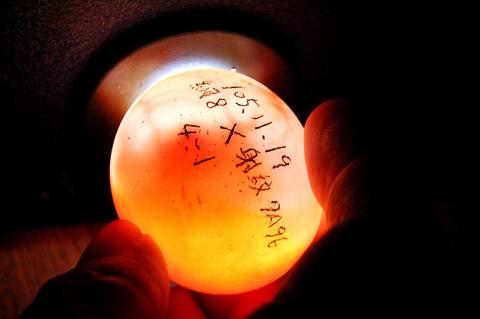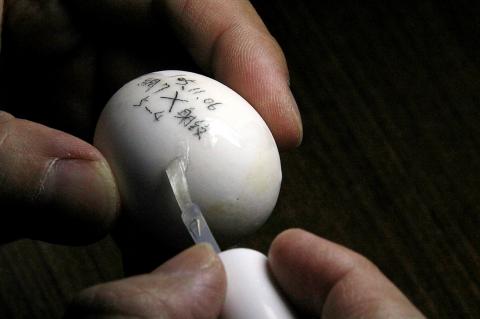Taipei Zoo has found a way to increase the number of hatchlings that survive from a batch of eggs laid by an endangered turtle species by repairing the shells, zoo officials said.
The zoo collects the eggs from laying grounds and incubates them, sealing any cracked eggs it finds to prevent fluids from leaking out or contaminants from entering, the officials said, adding that the damaged eggs are classified according to a three-level scale.
The first level describes eggs which only have slight fractures; the second those in which at least the inner membrane is still fully intact and the third for eggs in which the membrane has been torn and there has been loss of fluid, officials said.

Photo courtesy of Taipei Zoo
Most first-grade damage is repaired by painting over fractures with non-toxic clear nail polish, while those with second or third-grade damage can be fixed using other methods, officials said.
One technique involves fixing pieces of sanitized shell taken from already hatched eggs or those that the zoo was unable to save over damaged areas; another involves covering such areas in a plastic paraffin film and sealing it by applying heat; the third involves using Tegaderm transparent film dressing, which the zoo said is more expensive, but is waterproof and airtight.
After staff repair the eggs, they take turns watching over them until they hatch, the zoo said.

Photo courtesy of Taipei Zoo

A strong continental cold air mass is to bring pollutants to Taiwan from tomorrow, the Ministry of Environment said today, as it issued an “orange” air quality alert for most of the country. All of Taiwan except for Hualien and Taitung counties is to be under an “orange” air quality alert tomorrow, indicating air quality that is unhealthy for sensitive groups. In China, areas from Shandong to Shanghai have been enveloped in haze since Saturday, the ministry said in a news release. Yesterday, hourly concentrations of PM2.5 in these areas ranged from 65 to 160 micrograms per cubic meter (mg/m³), and pollutants were

Taiwan’s armed forces have established response protocols for a wide range of sudden contingencies, including the “Wan Chun Plan” to protect the head of state, the Ministry of Defense (MND) said today. After US President Donald Trump on Saturday launched a series of airstrikes in Venezuela and kidnapped Venezuelan President Nicolas Maduro, concerns have been raised as to whether China would launch a similar “decapitation strike” on Taiwan. The armed forces regularly coordinate with relevant agencies and practice drills to ensure preparedness for a wide range of scenarios, Vice Minister of National Defense Hsu Szu-chien (徐斯儉) told reporters before a

EVA Airways on Saturday said that it had suspended a pilot and opened an investigation after he allegedly lost his temper and punched the first officer several times as their plane was taxiing before takeoff at Los Angeles International Airport. According to a report published on Thursday by The Reporter, the incident occurred after the flight’s Malaysian first officer tried to warn the Taiwanese pilot, surnamed Wen (文), that he was taxiing faster than the speed limit of 30 knots (55.6kph). After alerting the pilot several times without response, the first officer manually applied the brakes in accordance with standard operating

NOT AN OPENING: Trump’s violation of international law does not affect China’s consideration in attacking Taiwan; Beijing lacks capability, not precedent, an official said Taiwanese officials see the US’ capture of the president of Venezuela as a powerful deterrent to Beijing’s aggression and a timely reminder of the US’ ability to defeat militaries equipped with Chinese-made weapons. The strikes that toppled Venezuelan President Nicolas Maduro signaled to authoritarian leaders, including Chinese President Xi Jinping (習近平), US President Donald Trump’s willingness to use military might for international affairs core to US interests, one senior official in Taipei’s security circle said. That reassured Taiwan, the person said. Taipei has also dismissed the idea that Trump’s apparent violation of international law could embolden Beijing, said the official, who was not